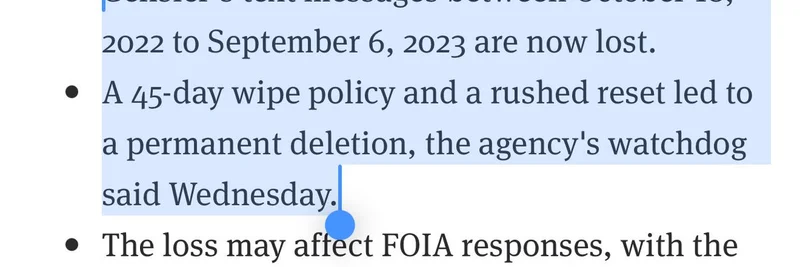Hey folks, if you've been following the wild world of crypto regulation, you know the SEC under Gary Gensler has been like that overzealous hall monitor at school—subpoenaing everyone in sight, especially us in the meme token and DeFi spaces. But now, in a twist straight out of a meme coin plotline, it turns out Gensler himself might have hit the delete button on some crucial evidence. Uniswap founder and CEO Hayden Adams couldn't resist calling it out in a fiery tweet that's got the crypto community buzzing.
Adams, who's no stranger to SEC scrutiny himself, dropped this gem on X (formerly Twitter): "Smh bro subpoenaed the texts of every founder in crypto and then deleted his own before leaving office." He's quoting a post from crypto entrepreneur Kain Warwick (better known as @kaiynne), who quipped, "This is the most surprising accident of all time. The SEC should fine themselves a trillion dollars." And yeah, it's linked to a bombshell Decrypt article revealing that Gensler's text messages from October 18, 2022, to September 6, 2023, are gone for good.
Let's break this down simply, because technical jargon isn't our vibe here at Meme Insider. The SEC's own watchdog office blames a combo of a 45-day automatic wipe policy on government-issued phones (meant to keep data secure) and a rushed factory reset after Gensler's device stopped syncing with the agency's system for over two months. They missed some warnings, had shaky coordination with their tech vendor, and basically, poof—nearly a year's worth of texts vanished. The National Archives got the heads-up back in June 2023, and this could mess with Freedom of Information Act (FOIA) requests, which are basically the public's way of peeking behind the regulatory curtain.
Why does this matter for us in the meme token world? That missing 10-month window? It's prime time for some of the SEC's biggest crypto moves. We're talking charges against Genesis and Gemini in January 2023, slapping Kraken with a $30 million fine in February for their staking program, and Gensler telling Congress in April that most crypto assets (yep, including those fun meme coins like Dogecoin or PEPE) qualify as securities under the Howey Test—a legal yardstick from the 1940s that decides if something's an investment contract. Oh, and internal docs showed Ethereum getting the "security" label in March 2023. Imagine what those deleted texts might reveal about the behind-the-scenes chatter on these crackdowns. Were there heated debates? Cozy convos with Wall Street? Or just cat memes? (Kidding on that last one... maybe.)
The irony isn't lost on Adams, who's built Uniswap into a DeFi powerhouse that's faced its own SEC woes. While crypto founders like him have been forced to hand over every digital crumb, Gensler skates away with a "tech glitch" excuse. The replies to Adams' tweet are a goldmine of crypto salt: one user jokes about carrying old iPhones just to be ready for court against Gensler, another calls for his prosecution, and there's even speculation about subpoenaing everyone he texted during that period. It's got that classic "rules for thee but not for me" vibe that's fueled so many meme coin rallies.
For blockchain practitioners and meme token enthusiasts, this saga underscores the opacity in U.S. regulation. If the SEC wants transparency from us—demanding texts, wallets, and trade histories—maybe they should lead by example. It could open doors for more FOIA pushes into how agencies view tokens like SHIB or FLOKI. As Gensler steps down (he's out as of now, right?), this "lost" data might haunt future chairs and give crypto a fighting chance in court.
What do you think—accident or cover-up? Drop your takes in the comments, and keep an eye on Meme Insider for more on how regulatory drama shakes up the token world. Stay decentralized, friends.



